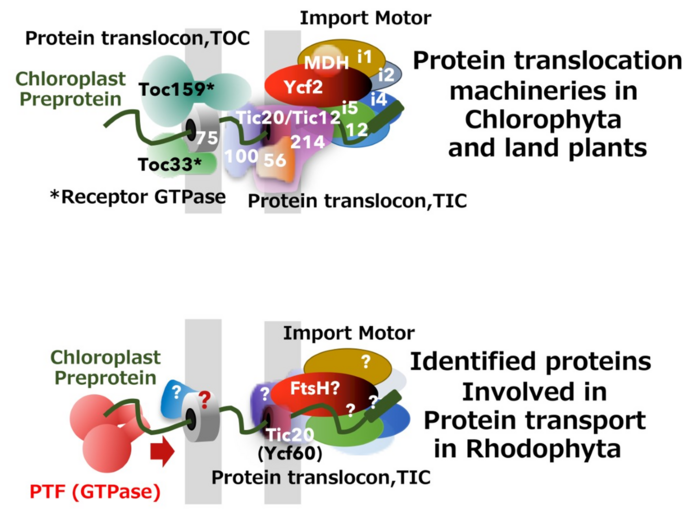Osaka, Japan – The oceans are often called Earth’s final frontier. Now, researchers from Japan have shown that this applies at all levels with their discovery of a new type of protein that mediates the transport of proteins into chloroplasts in Rhodophyta (reg algae).

Credit: Masato Nakai
Osaka, Japan – The oceans are often called Earth’s final frontier. Now, researchers from Japan have shown that this applies at all levels with their discovery of a new type of protein that mediates the transport of proteins into chloroplasts in Rhodophyta (reg algae).
Chloroplasts are organelles (specialized cellular subcompartments) that enable plants, algae, and related organisms to photosynthesize. The Archaeplastida (a major group that contains red algae, green algae, land plants, and the glaucophytes – a group of single-celled freshwater algae) are thought to share the same chloroplast protein transport mechanisms associated with translocons. Translocons are protein complexes involved in the movement of proteins and polypeptides across envelope membranes within cells; the ones thought to be shared among the Archaeplastida are the translocons at the outer chloroplast envelope (TOC) and the inner chloroplast envelope (TIC).
“It was unclear whether the red and green algal lineages possess shared chloroplast protein import mechanisms,” says lead author of the study, Sanghun Baek. “The aim of our study was to find out about these mechanisms in red algae.” The researchers investigated these mechanisms in the red algae Cyanidioschyzon merolae, developing a new method for biochemically identifying the proteins associated with the import of other proteins into chloroplasts. These imported proteins are synthesized in the cytosol (the liquid matrix that surrounds the organelles within a cell) and transported across the outer and inner envelope membranes of chloroplasts.
“From C. merolae, we found a new targeting factor associated with the recognition of chloroplast preproteins synthesized in the cytosol, and with the way these preproteins are targeted at the outer membrane of chloroplasts,” explains Masato Nakai, senior author.
Preproteins (also known as precursor proteins) carry a so-called transit peptide for this recognition that are later to be removed after the import into chloroplasts. The study’s results indicate that red algae use mechanisms involving TIC to transport proteins across the inner membrane of chloroplasts but have kept a distinct mechanism for targeting preproteins that has been retained among the red lineages, and possibly the glaucophytes.
“We identified a distinct class of proteins that bind to guanosine-5′-triphosphate (GTP); these proteins may act as chloroplast targeting factors in red algae,” says Baek.
The results of this study could be used to boost the photosynthetic abilities of non-chlorophytic algae (algae outside the group Chlorophyta, from which land plants arose), which contribute to the production of a large proportion of marine biomass, and are also commercially farmed.
###
About Osaka University
Osaka University was founded in 1931 as one of the seven imperial universities of Japan and is now one of Japan’s leading comprehensive universities with a broad disciplinary spectrum. This strength is coupled with a singular drive for innovation that extends throughout the scientific process, from fundamental research to the creation of applied technology with positive economic impacts. Its commitment to innovation has been recognized in Japan and around the world, being named Japan’s most innovative university in 2015 (Reuters 2015 Top 100) and one of the most innovative institutions in the world in 2017 (Innovative Universities and the Nature Index Innovation 2017). Now, Osaka University is leveraging its role as a Designated National University Corporation selected by the Ministry of Education, Culture, Sports, Science and Technology to contribute to innovation for human welfare, sustainable development of society, and social transformation.
Website: https://resou.osaka-u.ac.jp/en
Journal
Proceedings of the National Academy of Sciences
DOI
10.1073/pnas.2208277119
Method of Research
Experimental study
Subject of Research
Cells
Article Title
A distinct class of GTP-binding proteins mediates chloroplast protein import in Rhodophyta
Article Publication Date
15-Aug-2022




